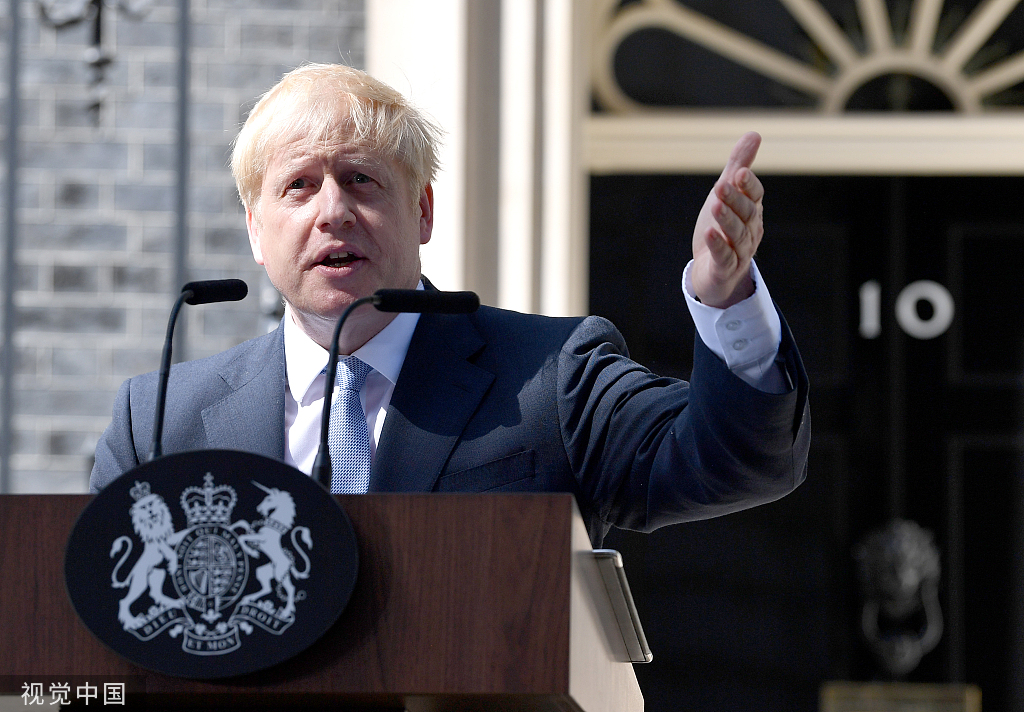Johnson's political weather vane swings wildly
- By Robert Griffiths
 0 Comment(s)
0 Comment(s) Print
Print E-mail China.org.cn, August 1, 2019
E-mail China.org.cn, August 1, 2019

The fate of Prime Minister Boris Johnson's Brexit policy will almost certainly determine the fate of his newly-formed government. It may also have a considerable bearing on other important aspects of British foreign and military policy should his government survive parliamentary opposition and a possible snap election.
Of course, Johnson has not taken office with a blank sheet on which to write his own foreign policy. Powerful vested interests in business, military and political circles have long since established the main contours of British policy in most areas.
However, empty spaces will open up for him and his administration to fill. Moreover, Johnson has more self-belief and reckless unpredictability than most politicians. He will try to depart from orthodoxy - as well as from consistency and truthfulness - wherever it suits his own interests and beliefs to do so.
Although he currently threatens to take Britain out of the European Union without a bilateral deal if necessary, he was still supporting EU membership and rejected the idea of any no-deal Brexit until shortly before the June 2016 referendum.
Having led the campaign to leave the EU, today he trumpets Britain's largely illusory "special relationship" with the United States, especially now that Donald Trump is in charge there. Yet, Johnson has publicly departed from several of the U.S. President's policies.
For example, far from seeing the Gulf crisis caused by Trump's withdrawal from the Iranian nuclear treaty as a possible cause for war, Johnson urges a diplomatic solution because the U.S.-led policy of military confrontation is "not a sensible option." At the same time, he would reimpose sanctions against Iran should the Tehran regime breach the treaty's limits on uranium enrichment.
In line with British ruling class priorities, control over resources, markets and transport routes in the quest for corporate profit will be uppermost in his approach to policy-making.
Above all, he wants to reach a comprehensive free trade deal with President Trump along the lines of the on-off-on Transatlantic Trade and Investment Partnership between the EU and USA. This would allow business corporations almost unlimited and tariff-free access to each other's markets, together with the right to challenge restrictive standards and other barriers through a special legal mechanism.
China's lucrative market for British exporters and investors and Britain's growing reliance on inward investment from China makes Johnson cautious to deal with the sensitive relationship with China.
When visiting China as Foreign Secretary in 2016, he said that the British government had been among the first to sign up to the Beijing-based Asian Infrastructure Investment Bank, much to White House disapproval. Johnson went on to praise China's flagship Belt and Road Initiative.
Should Johnson take Britain out of the EU, especially without a trade agreement, he will want a rapid expansion of economic relations with China.
Nonetheless, while welcoming the 45% increase in Britain's trade with China over the past decade, Johnson seeks to add more than one or two strings to his bow.
Hailing the re-election of India's Prime Minister Modi recently, Johnson looked forward to a similar boost in bilateral trade. Outside the EU, he could re-balance Britain's immigration policy away from European migrant workers and towards Indians to help fill a labor market shortage in key sectors, including agriculture.
Johnson is less positive about relations with Russia. As Foreign Secretary, he had initially hoped to "reset" Britain's relationship with President Vladimir Putin, only for this to collapse after the Salisbury poisonings and the subsequent mass expulsion of Russian spies and diplomats.
Johnson clearly regards Russia as a threat to British and Western security and criticized Germany's decision to import Russian natural gas through the Nord Stream 2 pipeline. More enthusiastic about NATO than Trump, he agreed with the President's complaint about alleged light defense spending.
Nor is Johnson against NATO expansion into the Middle East. Having acknowledged - three years after the event - that the Iraq War was a "colossal mistake," he still sought early British and NATO military intervention in Syria to discourage Russian involvement.
Doubtless Britain's Prime Minister will seek a strong economic and military alliance with America, although it will not extend to the environmental sphere (unlike Trump, Johnson is no climate change denier).
However, if Johnson's inconsistent and contradictory approach to foreign policy wrong-foots his fellow political leaders and throws them off balance, so much the better in his view. In that respect, at least, he resembles the U.S. President whom he once described as "unfit" for presidential office, before more recently discovering Trump's "many, many good qualities."
Robert Griffiths is a former Senior Lecturer in Political Economy and History at the University of Wales and currently the General Secretary of the Communist Party of Britain.
Opinion articles reflect the views of their authors only, not necessarily those of China.org.cn.
If you would like to contribute, please contact us at opinion@china.org.cn.






Go to Forum >>0 Comment(s)